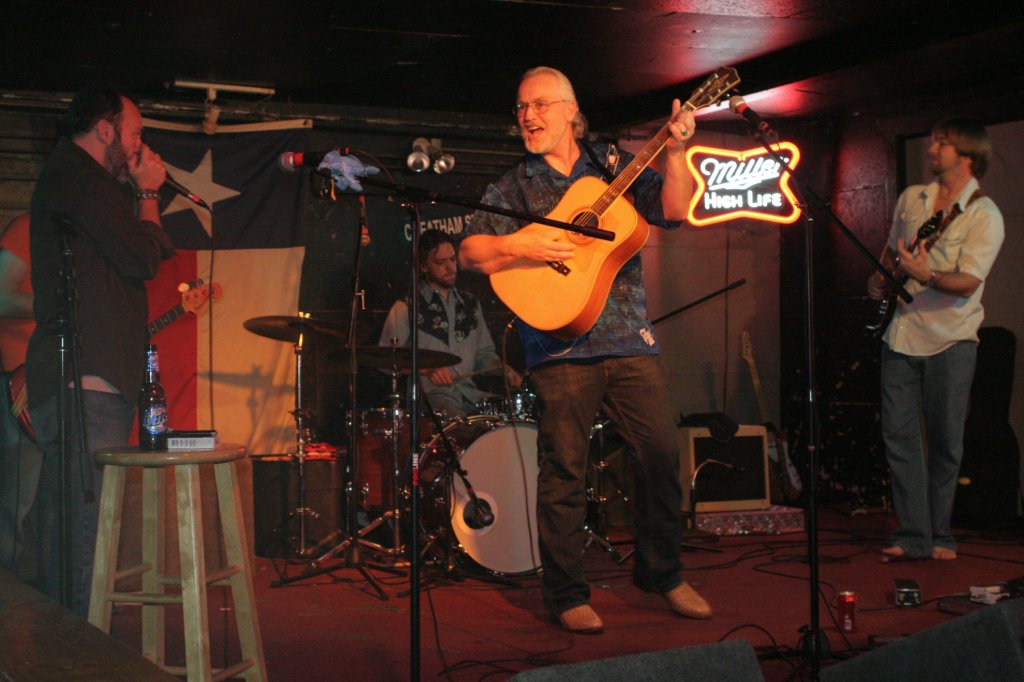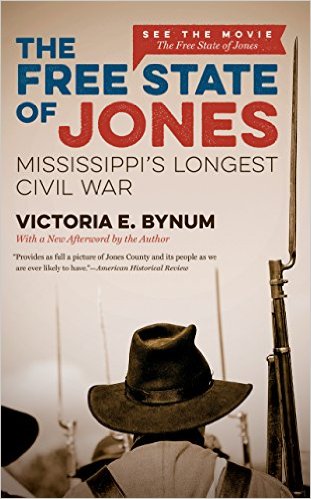Here’s how a lost story from the Leaf River swamp in southeast Mississippi turned into my song, “Jones County Jubilee.” The song’s roots are in a trip to Jones County, Mississippi in summer 1993 with my wife, Victoria E. Bynum, author of Free State of Jones. This was our second summer trip to Jones County. At that time, she was in the early stages of research for her 2001 book that led to a major Hollywood movie in 2016 starring Matt McConaughey. Without her book and our research trips, I never would have written the song. On that second trip, I was driving our little 1989 Mercury Tracer, searching for the old Mason Creek homestead site of Albert and Mason Knight, Newton Knight’s parents, when I spotted a guy in his truck out in a field. I pulled over and suggested that Vikki get out of the car and ask him for directions. He instructed her to have me pull the car up under a shade tree by his house, and he motioned he’d join us there in a few minutes.


The next thing I knew, we were bouncing along in a truck with Julius Huff, who took us to the Jackie Knight cemetery where several members of Captain Newt Knight’s band of Unionists were buried in the Leaf River swamp after Confederate forces hanged them. I got my first good feel of Jones County history, folklore, and culture when he pulled out a key to unlock the old gate guarding the bumpy road down into the swamp. I recall vividly how chills ran up and down my spine when I read the tombstone inscription, “They were summarily executed by the Confederate Cavalry During the War Between the States for their honest convictions, April 14, 1864.” It felt like we had entered a hallowed space. Looking back, I think it was the starting point for my song, “Jones County Jubilee,” even though I didn’t write it till a decade later.

Vikki and I spent delightful hours in the truck with Julius, who stressed the beauty of Rachel Knight, Newt’s lover and accomplice in the Deserters’ Den band of Unionists in the Leaf River swamp. Sympathetic with Newt’s wartime anti-Confederate military actions, Julius speculated that Rachel, enslaved by Jesse Davis Knight, must have “HOO-DOOED” Newt. We picked our way through thick brush, vigilant ‘lest we disturb a copperhead, rattlesnake, or a cottonmouth as Julius also showed us the spot where Ben Knight and Sil Coleman were hanged after the Confederate Cavalry’s hound dogs ran them down. According to folklore, Ben, who was badly chewed up by the dogs, raised himself up in the wagon and begged his executioners for a drop of water. So great was his thirst that when denied his final earthly request, he prayed that water might bubble up into his grave to relieve his torment. Martha Wheeler, a former slave interviewed by the WPA, recalled that when her husband helped to dig Ben’s grave, water filled it so fast that he couldn’t dip it out fast enough, even though there had been no rain for quite a while.
On a research trip to Jones County again in July 1994, Vikki and I met Earle Knight, who took us to the home of Jerry Jones to get the key to the gated fence on the property where Newt and Rachel are buried. Earle, age 89 at the time, strained his eyes as I carefully steered our new Ford Taurus down a rather primitive dirt road with a somewhat steep descent into the bottomlands in search of their graves. As I maneuvered the car to straddle washed-out gullies to the bottom, and as I later plowed through fields of thick weeds that came up over the hood of the car, I began to have second thoughts about just what in the hell we were doing. I mean, there we were, down in an isolated swamp, dependent on the memory of an eighty-nine-year-old man who didn’t remember how many years it had been since he last visited the cemetery. From time to time along the way, we spotted a tree limb with a small piece of fabric tied to it as a marker, but the markers were no longer easy to follow due to changes in vegetation and overgrown brush. Earle seemed confused at times about which way to go. The distant rumble of thunder added tension and lent a bit of urgency to our search for the graves.

“Stop!” Earle said suddenly in a soft-spoken manner as he peered out his backseat window. Telling us to stay in the car, he opened the door and went poking around in the brush. As he vanished for a very long ten or fifteen minutes, I muttered to Vikki: Oh, SHIT!” What if he suffers a heart attack or a stroke out there in the sweltering, muggy heat? Besides, the old road had taken so many twists and turns and the weeds were grown so high and the brush so thick that we might never find him or our way out of there. My fears eased when Earle reappeared and summoned us. He found the graves. “Praise the Lord,” I think I might have exclaimed under my breath at the time. Off we traipsed through the brush to view the graves.

In the years ahead, Vikki and I became familiar faces in the Jones County area, especially among members of the Knight family. Florence Blaylock opened her house to us, fed us sumptuous meals, introduced us to other members of the Knight family, invited Vikki to speak at a Knight-Booth family reunion, and took us to services of the Seventh Day Adventist Church of Soso. The owners of Martins Restaurant near the Mississippi Department of Archives and History in Jackson greeted us by name each summer, offering us free pieces of pie after we filled up on their savory cafeteria-style food.
I did not set out to write a song about the Civil War history of Jones County. In fact, I never thought about it until one day years later I sat down with my guitar to write a song with a swampy feel and funky little groove in F#7. Out came the words “Way down in Mississippi,” and then the lyrics and music flowed. I wanted to title the song, “Free State of Jones,” but I soon discovered a great song by Cary Hudson, of Sumrall, Mississippi, that already had the name. That’s when I became acquainted with Cary’s music and his band, Blue Mountain. What a treat on May 13, 2006, when Vikki and I heard Cary perform his song at Cheatham Street Warehouse in San Marcos, Texas. About seven months later, Cary and I shared the stage at Cheatham Street, and he quickly became a friend and a favorite songwriter of mine.

“Jones County Jubilee,” inspired by Vikki’s book and by my experiences in Jones County, became popular among fans as I performed it with my band, Doctor G and the Mudcats, in south central Texas. I included it on my CD, Mudcat (Cheatham Street Records, Paper Napkin Music, B.M.I., 2005), produced by Kent Finlay. Soon after Vikki and I met movie director Gary Ross on the set of “Free State of Jones” in March 2015, she sent my song to him for consideration in the movie. He liked it, but he commissioned Lucinda Williams, a prolific singer-songwriter and Grammy Award Winner, to write music for the movie. I have been a fan of hers for more than two decades. Her song, “I’m Crying,” plays as credits roll at the end of the movie. Below are links to all three of the mentioned songs. The first is a LIVE performance by Cary Hudson singing “Free State of Jones” at the Root Beer Saloon in Sumrall, Mississippi in 2010. The second link is to my song, “Jones County Jubilee,” and the third takes you to Lucinda Williams’s “I’m Crying.” Hope you enjoy all three.


Leave a comment